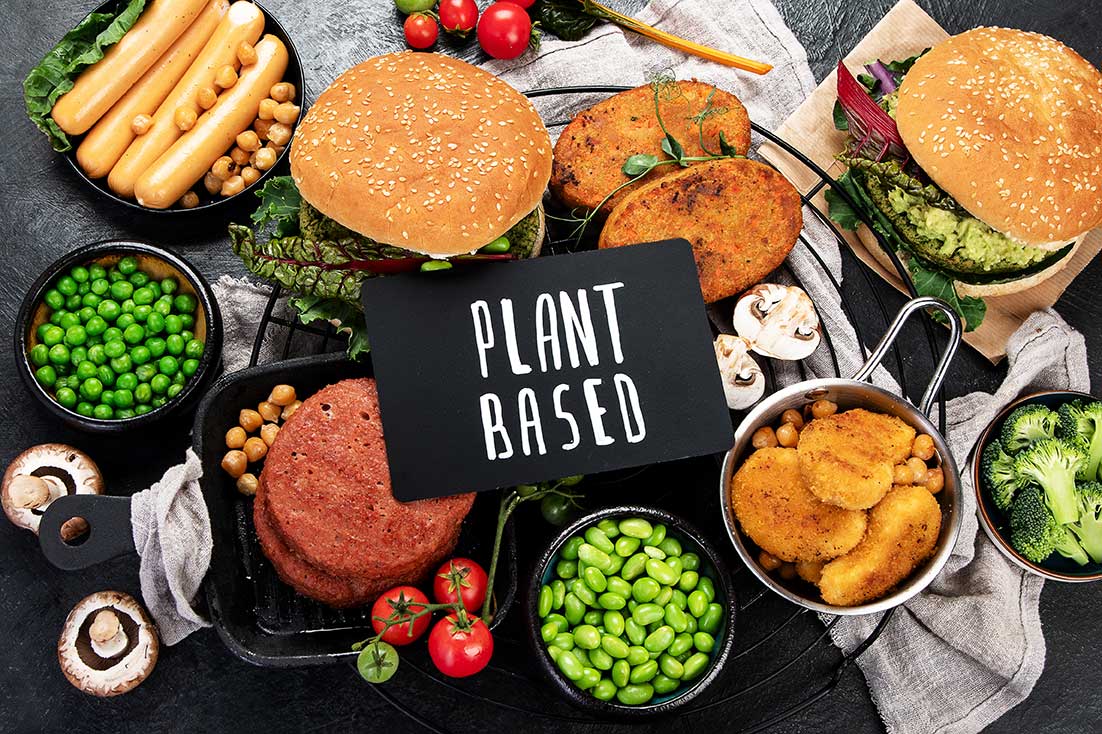A Beginner’s Guide to Cooking With Plant Based Chicken at Home
A Beginner’s Guide to Cooking With Plant Based Chicken at Home
Blog Article
Everything About Healthy Food: Advantages of Checking Out Plant Based Alternatives
The conversation bordering plant-based diet regimens has actually gained significant attention in current years. Many individuals are exploring the possible wellness benefits, nutritional advantages, and ecological influences linked with these dietary options. As people become much more aware of their food's influence on well-being and sustainability, questions emerge concerning the functionalities of embracing such a way of life. What particular changes can one anticipate, and exactly how might these choices reshape not just individual wellness but additionally the world's future?
Recognizing Plant-Based Diet Regimens
Numerous individuals associate plant-based diets primarily with vegetarianism or veganism, these diets can include a large variety of eating patterns that prioritize entire, minimally processed plant foods. Such diet regimens usually include fruits, vegetables, whole grains, nuts, vegetables, and seeds, while getting rid of or limiting animal items. This flexibility enables individuals to tailor their dietary options according to individual choices and nutritional needs. Some might adopt a primarily plant-based diet regimen while still occasionally consuming meat or milk, typically described as a flexitarian strategy. The focus continues to be on integrating even more plant foods, which can cause a diverse variety of flavors and dishes. Recognizing these various interpretations of plant-based eating is vital for valuing its availability and appeal in contemporary food society.
Health Conveniences of Plant-Based Foods
The health and wellness advantages of plant-based foods are substantial, providing a nutrient density benefit that sustains overall wellness. Research indicates that these foods can enhance heart wellness and play a vital role in reliable weight administration. By integrating a lot more plant-based choices, individuals might boost their dietary options and advertise lasting health and wellness.
Nutrient Density Advantage
Nutrient thickness plays an important duty in the wellness advantages of plant-based foods, making them an engaging choice for those seeking a balanced diet plan. Plant-based foods, such as fruits, vegetables, legumes, nuts, and whole grains, are commonly rich in necessary vitamins, minerals, and anti-oxidants while being lower in calories. This high nutrient thickness enables people to take in less calories while still fulfilling their dietary demands. In addition, these foods are packed with nutritional fiber, advertising digestion health and wellness and aiding in weight administration. By including nutrient-dense plant-based choices, customers can improve their overall health and wellness, support their body immune systems, and lower the threat of persistent diseases. Inevitably, the nutrient thickness of plant-based foods underscores their relevance in a health-conscious lifestyle.
Heart Wellness Enhancement

Weight Monitoring Support
In enhancement to advertising heart wellness, a plant-based diet can substantially assist in weight administration. This dietary strategy highlights whole foods such as fruits, veggies, beans, nuts, and whole grains, which are usually lower in calories and greater in fiber compared to animal-based items. The high fiber material helps boost satiation, lowering general calorie consumption. Moreover, plant-based diets are often abundant in important nutrients while low in unhealthy fats, making it less complicated to keep a healthy and balanced weight. Gluten Free BBQ Sauce. Research study indicates that people who take on a plant-based way of living tend to have lower body mass indexes (BMIs) and experience even more successful weight management compared to those that eat meat-heavy diets. As a result, welcoming plant-based choices is a critical choice for efficient weight monitoring
Nutritional Worth of Plant-Based Ingredients
Plant-based active ingredients are abundant in vital nutrients, using a varied selection of vitamins, minerals, and antioxidants that add to total health and wellness. A comparison of protein resources exposes that while pet items are usually considered as remarkable, several plant-based alternatives give ample healthy protein and other advantageous compounds. Understanding the dietary worth of these active ingredients can help people make educated dietary selections.
Essential Nutrients in Plants
Nutrient-rich ingredients found in plants offer a varied array of essential vitamins and minerals that contribute greatly to overall health and wellness. These active ingredients are rich in vitamins A, C, and K, which support immune function, vision, and blood clotting, respectively. On top of that, plants give vital minerals such as magnesium, potassium, and calcium, critical for heart health, muscle feature, and bone stamina. The existence of fiber in plant-based foods aids food digestion and promotes a healthy gut microbiome. Anti-oxidants, discovered generously in vegetables and fruits, aid battle oxidative tension and reduce swelling. Several plant foods are reduced in calories yet high in nutrients, making them an excellent selection for those seeking to preserve a healthy weight while ensuring suitable nutrient intake.

Comparing Protein Sources
Healthy protein sources differ considerably in their dietary accounts, with plant-based active ingredients providing distinct advantages. Unlike animal proteins, which often have hydrogenated fats and cholesterol, plant healthy proteins have a tendency to be lower in these unhealthy components. Legumes, nuts, seeds, and entire grains are abundant in necessary amino acids, fiber, vitamins, and minerals. Lentils give high protein content along with considerable iron and folate, while quinoa is a complete protein, offering all 9 crucial amino acids. Furthermore, plant-based proteins are frequently accompanied by anti-oxidants and phytochemicals that support overall wellness. The change to plant-based protein resources not only boosts nutritional consumption yet additionally aligns with lasting dietary techniques, minimizing environmental impact and advertising long-term health and wellness benefits.
Environmental Influence of Plant-Based Eating
As recognition of climate adjustment grows, many people are exploring lasting nutritional options that can substantially lessen their ecological footprint. Plant-based eating has actually emerged as a significant factor to reducing greenhouse gas discharges, which are largely connected with livestock manufacturing. The farming of fruits, grains, beans, and vegetables commonly needs less sources, such as water and land, compared to animal farming. In addition, plant-based diets can result in lowered deforestation, as much less land is required for grazing animals or expanding animal feed. By moving in the direction of plant-based options, consumers can support biodiversity and promote much healthier communities. On the whole, embracing plant-based eating not only benefits personal health and wellness yet likewise stands for a vital action toward environmental sustainability and preservation initiatives.
Overcoming Common Misconceptions
While lots of people identify the benefits of a plant-based diet plan, numerous misunderstandings usually discourage them from totally welcoming this way of living. An usual idea is that plant-based diet regimens lack enough protein; nevertheless, many plant sources, such as vegetables, nuts, and tofu, provide enough protein. Additionally, some presume that this diet plan is costly, when in reality, staples like beans, rice, and seasonal vegetables can be fairly inexpensive. One more misunderstanding is that plant-based eating is overly limiting, whereas it actually provides a diverse selection of foods and flavors. Ultimately, many worry that a plant-based diet regimen might result in shortages, yet with appropriate planning, people can obtain all needed nutrients, consisting of vitamins and minerals, while enjoying a wide array of scrumptious dishes.
Tips for Transitioning to a Plant-Based Way of life
Making the shift to a plant-based way of living can be an enriching experience, though it usually calls for some advice to browse the first modifications. People are urged to start progressively, integrating even more fruits, veggies, beans, and entire grains right into their meals while minimizing meat and dairy consumption. Dish preparation is necessary; preparing an once a week food selection can assist relieve the adjustment and protect against final harmful options. Discovering cooking methods and new dishes can additionally preserve and boost the experience enjoyment regarding plant-based eating. Furthermore, joining support system or neighborhoods can give motivation and share beneficial pointers. Staying educated regarding nutrition assurances well balanced meals, protecting against shortages while cultivating a healthy and balanced, satisfying plant-based lifestyle.

Delicious Plant-Based Meal Ideas
Discovering scrumptious plant-based meal concepts can influence people to embrace a more nutritious diet. One prominent option is a hearty quinoa salad, featuring cherry tomatoes, cucumber, and a vibrant lemon-tahini dressing. One more favorite is a full-flavored lentil stew, loaded with carrots, celery, and aromatic natural herbs, perfect for a soothing supper. For morning meal, over night oats made with Gluten Free BBQ Sauce almond milk, chia seeds, and covered with fresh berries offer a nutritious beginning to the day. In addition, a lively veggie stir-fry with tofu and a selection of vivid veggies can be a fast yet pleasing dish. Velvety avocado salute on whole-grain bread, sprayed with seeds and spices, uses an easy yet delicious treat. These meals showcase the variety and splendor of plant-based consuming.

Often Asked Questions
Can a Plant-Based Diet Plan Offer Enough Healthy Protein?
The concern of whether a plant-based diet can offer adequate protein is common. Numerous resources, consisting of legumes, nuts, seeds, and entire grains, can meet healthy protein needs properly, sustaining a healthy and balanced diet regimen for individuals.
Are Plant-Based Diet Plans Suitable for Kid?
The viability of plant-based diet regimens for youngsters depends upon cautious preparation. Adequate nutrients must be ensured, consisting of minerals, proteins, and vitamins. With proper advice, such diet regimens can sustain healthy growth and advancement in kids.
Exactly how Do I Eat in restaurants on a Plant-Based Diet plan?
Dining out on a plant-based diet entails seeking dining establishments with diverse food selections, asking for modifications, and discovering vegan-friendly options. Preparation in advance and interacting dietary choices can improve the eating experience while maintaining dietary options.
What Prevail Allergens in Plant-Based Foods?
Typical irritants in plant-based foods include soy, gluten, nuts, and seeds - BBQ Sauces. Individuals complying with a plant-based diet regimen must recognize these allergens and review tags thoroughly to prevent damaging reactions and assure secure usage
Can Plant-Based Diets Aid With Weight Loss?
Research study suggests that taking on a plant-based diet regimen may help with weight loss because of its typically lower calorie density and higher fiber material. This mix can enhance satiety, assisting individuals manage their caloric consumption effectively. Lots of individuals link plant-based diet regimens mostly with vegetarianism or veganism, these diets can incorporate a vast array of consuming patterns that focus on entire, minimally refined plant foods. Nutrient thickness plays an essential role in the health benefits of plant-based foods, making them an engaging selection for those looking for a well balanced diet plan. Plant-based diet plans have been shown to considerably improve heart health, as they frequently include elements that sustain cardiovascular function. In addition to advertising heart health and wellness, a plant-based diet plan can significantly help in weight monitoring. A typical belief is that plant-based diets do not have enough protein; nonetheless, numerous plant resources, such as vegetables, nuts, and tofu, provide ample healthy protein.
Report this page